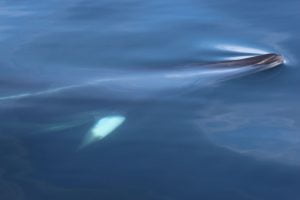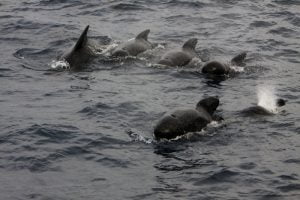We are frequently asked by customers why we are cancelling a trip, when the weather seems to be so nice where they are? We hope this will help explain why we cancel such a high number of trips…. even in summer.
The north east Atlantic is famously a place of very changeable and unsettled weather and rough seas. Ireland itself is notorious for its rainy and unpredictable weather. The reason for this is a corridor of fast- moving air known as the jet stream, that travels from west to east across the Atlantic and very much controls the weather we get in Ireland, the UK and western Europe for that matter. For this reason the sea is seldom calm and fine for long off the Irish coast.
Ideal weather for whale watching is a day with little or no wind, with no ocean swell, good visibility and dry. If the sun is shining that’s a bonus, but not a controlling factor in the decision making process. The most important factor to consider is the wind offshore. Ideally it needs to be less than force 4 on the Beaufort scale. At f5 and above the sea surface is picked up into breaking waves and white caps, making it difficult to spot any kind of cetacean.
On a calm day, large whale blows hang in the air for a while, hugely increasing the chance of spotting them. The splashes and surface activity of dolphins can be seen easily, as can surfacing minke whales. In stiff wind however, whale blows are soon dispersed, greatly reducing our chances of spotting them. Dolphins can only be sighted at close range, and minke whales the same, being difficult to detect in a mass of breaking waves.

The Atlantic swell is another major factor to consider. A high swell has two negative effects on whale watching. One is that any surfacing animal is easily hidden behind large swells and second is that people are more inclined to suffer from sea sickness in a big swell. Choppy water with waves in and of itself does not trigger sea sickness as much as big swells. The bigger the swell, the more people are inclined to be sick, and once this malady takes hold, you really just couldn’t care less about the wildlife, as all you want to do is get off the boat.
Another factor is visibility. The air cannot be too clear for spotting cetaceans. So people are often surprised to hear that we can go out whale watching when there is very cold polar air from the Arctic. These crisp conditions can be really good for land or boat based whale watching, as the air from these regions is generally dry and clear, and so visibility is excellent. Any bit of sea fog or thick misty conditions is detrimental to good spotting, as is heavy or persistent rain, in reducing visibility. And of all the weather variables, fog and sea mist are the most difficult to forecast, due to their patchy nature.
In West Cork’s changeable climate, trying to line up all the factors: wind, swell, precipitation and visibility, for a good day of whale watching, is a little like playing a fruit machine, as there is a big element of luck. If any of these factors are in excess we will cancel the trip rather than battle with poor conditions, which all too often makes for a disappointing or uncomfortable trip.
At Cork Whale Watch we aim to deliver the very best whale watching experience for you, and reading these environmental conditions is critical. We rely heavily on several sources of weather forecasting data, which has improved dramatically over the years, with multiple satellites looking down on the earth’s weather systems, and constantly feeding all the data to a huge complex computer, that is programmed to predict what happens next in meteorological terms. For all that, the predictions are not always correct, exacerbated by the fact the world’s weather is in a state of flux, because the earth is heating up rapidly, as a direct result of human activity changing the structure of the atmosphere.
Successful whale watching is as much about getting the weather on the day right than anything else, and this is why your bookings with us are “provisional”, subject to your re-confirmation with us two day before sailing. As it is only then that we can say with much certainty if the weather will be suitable on the day….and even this is no guarantee that we’ll always get it right. The weather can and does occasionally make fools of us all.
By Colin Barnes

